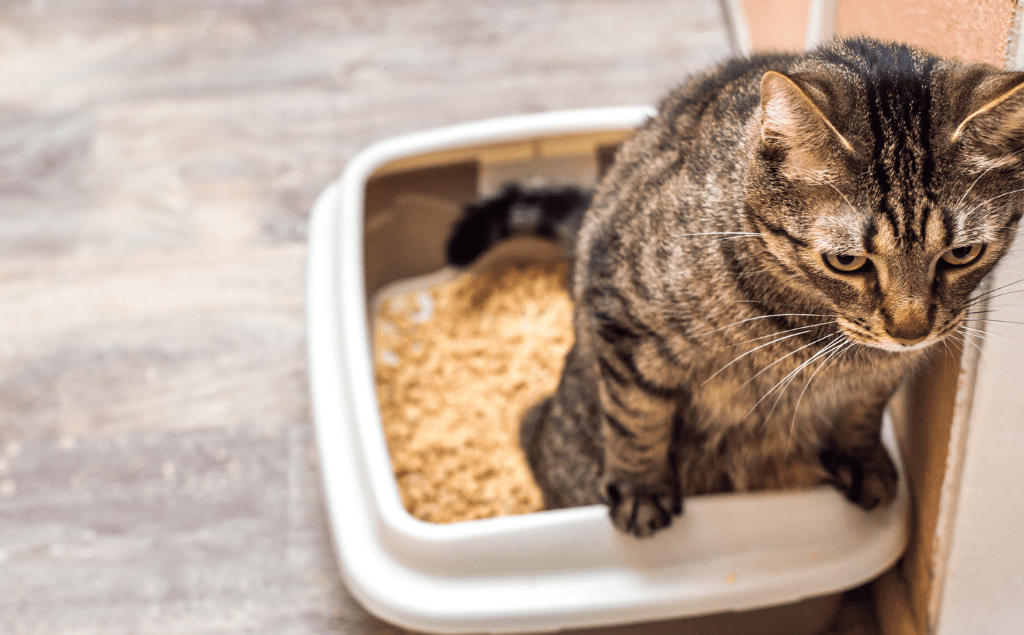Cat Having Problems Urinating: What You Need to Know About Why Your Cat Can't Pee
Being a cat parent comes with as much responsibility as it does rewards. When you love a cat, you can tell when they do not feel good. When your cat cannot pee or is having problem urinating, they will demonstrate many symptoms that you need to know and understand so that you can help your kitty come out from their bad spell.

Your baby could have a urinary tract infection, which could include the bladder or kidney. They could also have a renal calculus (kidney stone) or swelling of the urethra due to infection. Some cats are prone to urinary issues and will have difficulty periodically.
If you are going to see if your cat is normal with urination, you must first know how to compare your cat’s urination habits with the standard for a typical pee pattern for those of the feline persuasion.
What the Normal Pee Pattern in Cats?
On average, cats will urinate two to four times daily. This schedule is for a healthy cat who is regular. For the individual cat, it depends on the following factors:
- How much water they are drinking?
- If they have a healthy appetite
- If the kitty has any health issues
- The weather if it is hot
- The age of the kitty
Observing Your Cat's Peeing Habits
Your cat may be struggling to pee, and they may have to strain to get it out. When they cannot pee at all, this is a whole other story. You must take your cat to the emergency vet if they are not able to urinate at all. The inability to urinate can be fatal.
What are the Indications That Your Cat is Having Trouble Urinating or Can't Pee?
Some signs that indicate that your cat is having problems urinating or can't pee include, but aren't necessarily limited to:
Scratching at Litter Box and Other Odd Behaviors
Kitty is scratching at the litter pan but not urinating. They may also demonstrate peculiar routines such as crouching down to go to the bathroom, but nothing comes out.
Blood in Urine When Your Cat Can Pee
Blood in the Urine signifies a urinary tract infection, bladder stones, or blood clots. These problems may trigger inflammation, and infection can lead to the obstruction of the urethra.
Cat is Peeing Outside of Litter Box Due to a UTI
Your cat is not able to pee in their litterbox. Cats will often urinate outside of their litterbox when they have a UTI. When the cat has pain during urination, they associate the box with the pain; therefore, they go outside the box.
What is the Main Cause of Feline Urinary Tract Disease?
Cystitis is a bladder infection associated with a bacterial infection, mineral imbalance, and unusual pH levels. Cystitis is synonymous with the creation of microscopic mineral crystals in the cat’s pee. These crystals can form uncomfortable stones and be quite debilitating.
It can cause a severe block in the urethra, causing your cat to have difficulty urinating or not being able to pee at all.
Medical Issues That Can Cause a Cat to Have Problems Urinating or Them Not Being Able to Pee at All
When a cat is having problems urinating or if they're unable to pee at all, it is essential to know where they are coming from so that you and your vet can work together to devise an appropriate treatment plan. These issues can be harmful to kitty if not treated as soon as possible.
Some medical reasons why your cat is having problems urinating or can't pee are:
Urinary Tract Infection
If your cat comes into the litter box and does not produce an adequate amount of urine, they may have a urinary tract infection. It is also commonplace for your cat to pee outside the litterbox, especially when dealing with something stressful to kitty as a UTI.
Feline Interstitial Cystitis
Feline Interstitial Cystitis is a neural disorder that influences a cat's bladder. Cats who suffer from this ailment often look like they are urinating, but they are straining, and not much is coming out. They might have blood in their urine, which is serious.
This is another illness that can cause your furry feline to pee outside of the litter box. Cats who experience extreme stress often do this. If a cat presents with these symptoms, it is imperative to get them to the vet right away.
Kidney Stone or Blockage
If your cat is experiencing kidney stones or blockage, they will frequently come in and out of the litter box. There is often pain, and the kitty is sensitive when you touch their belly. It is important to get this treated, as it is often accompanied by severe pain.
What Can I Do to Help if My Cat is Having Problems Urinating or Can't Pee?
It's very important to contact an emergency veterinarian and your regular veterinarian if you notice that your cat isn't peeing or is having trouble doing so. That being said, there are some things that could help your cat go pee that your vet may recommend to you.
Below are some things that can help a cat pee if they're having problems urinating or are unable to do so at all:
Feed Your Cat Wet Foods
Wet foods contain a high percentage of water, which can trigger urination. Dry food is around 10 percent water, and canned food is 78 percent water. Cats are supposed to obtain most of their water from their food.
Medications
Some medications will cause cats to urinate more frequently. Some heart medications will draw the surplus of fluid from their body. Steroids can also make your cat drink more water, which makes the cat urinate more often.
You should never give your cat any types of medication before talking with a vet so they can tell you the best medication to give your cat and what dosage you should use.
Try to Have Your Cat Drink More Water
Kittens usually drink more frequently than adult cats do. As your cat gets older, keep an extra eye out to make sure they're drinking the appropriate amount of water to help keep them healthy.
Call an Emergency Vet Right Away if Your Cat's Having Urinating Problems or if They Can't Pee
There are a plethora of reasons your cat might have problems urinating. The most common is a UTI. Cystitis and kidney stones or blockages can cause problems as well. However, there is treatment available for the kitty to be able to pee freely without any problems, which is why seeking veterinary care right away is so important.
Our team at Emergency Veterinary Care Centers is trained to handle any emergency situation that comes through our doors, including when cats are having problems urinating or can't pee at all. We have locations in Highland, Westville and Mishawaka, each staffed with highly trained professionals who are there for your cat when they need us most.. When it comes to your pet's health, don't hesitate. Call us right now.
Recent Posts
About Us
At Emergency Veterinary Care Centers (EVCC), we know that pet emergencies are unpredictable and often stressful. That's why our team, with over 20 years of emergency and critical care experience, is ready to assist you and your pet in the toughest situations.


